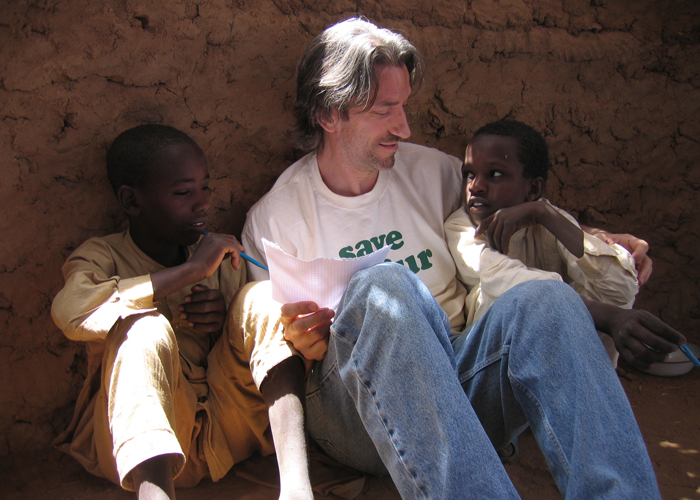You can leave this site quickly.
Learn more about Internet safety.
Heal the Healers Profile: John Prendergast
John Prendergast is Co-founder of Enough, the anti-genocide project at the Center for American Progress. John is co-author with Don Cheadle of the forthcoming Random House book, The Enough Moment. He sat down with Reunion's Editor-at-Large, Peter Hermann, to discuss his lifelong commitment to helping those in need.
Peter Hermann: How did you come to be doing what you do?
John Prendergast: I was very focused in my teen years on domestic poverty issues, issues of fairness and access. I focused on youth employment and education, mostly among high school dropouts in urban America, working with youth gangs, mediation, Big Brother, Big Sister, coaching, mentoring, all of that. And then, one night, I happened to be holed up at my house with an injury after another basketball mishap, and suddenly this footage comes on the TV. This is 1983, and it was the first footage coming out of the great Ethiopian famine. It was like a rock had hit my heart. I just could not believe human misery could exist on this scale and scope. I decided as soon as I can walk I'm going.
I spent the next few years traveling in Africa, trying to learn and understand the cause of that extraordinary misery. In the course of that exploration, I realized that I had a voice. I dedicated myself to affecting my government's policy so that it would be more of a voice of fairness for the people there.
PH: Some teenagers sit at home and play Halo and others go out skateboarding. And then there's you. Why were you the teenager interested in Big Brother programs and mentoring kids?
JP: I identified with the underdog and viscerally reacted against unfairness very early on. Certainly the difficulties I experienced in my own household as a kid fueled my anger at unfairness. I believe that a lot of my early fuel-and frankly, still today-is anger at systemic unfairness. It manifested itself early in very simple things like knowing that there are kids going hungry, and knowing we can do something about that. I mean, any school child can figure out that if we collect cans or if we go to the soup kitchen, we could actually make a little dent in that very immediate manifestation of the problem.
PH: You said "a rock hit your heart" when you saw on TV what was happening in Africa. That's a very vivid image. You obviously have a heart that responds to suffering. What do you do to care for it?

JP: Not to be melodramatic, but for twenty-five years after that moment, my heart sank into an abyss. Depression and melancholy were constant companions, and it's only been in the last few years where I have practiced self-care and addressed some of the underlying roots of that melancholy, the unaddressed issues of my childhood. Whether it's verbal or physical abuse, ostracization of some kind, alienation, or whatever kind of challenges a young person faces, no one's pain can be diminished or swept under the rug without great consequences down the road. I started to care for my heart that had slowly, steadily been encased with defensive walls to protect it not only from the human suffering I had immersed myself in, but also my own past demons.
I think that process of going back and really examining the truth of what happened to me as a young person and then figuring out what to do with that is utterly essential. I realized I didn't have to have a terrible emptiness in my stomach every day, that I didn't have to be filled with a deep sadness every time I woke up in the morning. I realized that wasn't normal. Taking care of my heart also had enormous implications for my work. It has become much more sustainable because I feel a lightness now, an enthusiasm, a real positivity, whereas before it was all heaviness and difficulty.
I can't do it on my own, though. I've got friends who are great listeners, who are caregivers in their own way. I've certainly also had the highly paid professional friend who has been of great benefit in guiding and encouraging me.




Your Voices